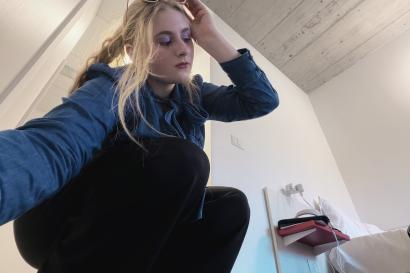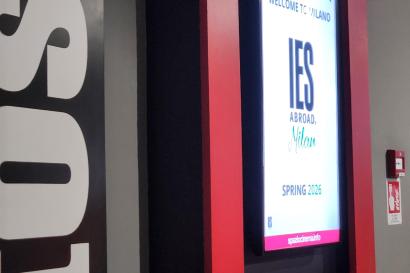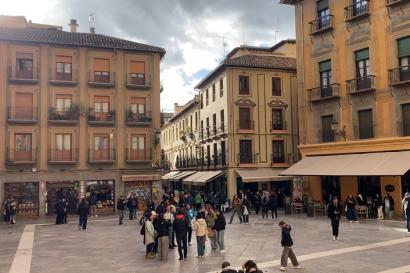To be honest, I’m not the biggest fan of probability theory. But I’ve found myself doing a lot of calculating these past few weeks—predicting the long-term profit of investing in a zumba class versus joining a hiking group, determining the expected return for spending time with my homestay family or other Spanish locals, figuring out the opportunity costs of travelling to Prague or staying in Granada for Easter week.
Having just witnessed a whole period of rebajas (sales), in Granada, it feels like every opportunity here has a price tag, measured in personal fulfillment and long-term utility. In the grand scheme of things, four months is a very short time, and since been here, I’ve been told over and over again, aprovechar el tiempo al máximo, or ‘use your time to the greatest advantage.’
Yet, in order to make the most of this study abroad opportunity, I’m tempted to believe that it’s always better to be informed, plan ahead, calculate and anticipate. Otherwise, I would have come all the way to Spain and spent all this time doing things that at the end of the day, no valía la pena, or ‘wasn’t worth it.’
When in a new and foreign environment, it seems that simply being in the world – going grocery shopping, attending class, talking to people on the street— tends to cost more of myself. Sometimes, at the end of the day, all I want to do is retreat back into my English speaking, probability calculating comfort zone. But then again, I have to tell myself, that this is the whole point: to be uncomfortable.
For example, the other day I decided to go the zumba class at the gym near me. I knew that there were a myriad of other activities happening on this Friday afternoon, but figured that I might as well try out this zumba class once. Though I got to the classroom exactly on time, there didn’t seem to be a class about to happen. I was uncomfortable just lingering around the area, looking like I had no idea what I was doing, and was about to head out of the gym when something inside me told me to wait, just for five minutes, to see if anyone else would come.
As I awkwardly stretched by myself, people started coming into the room. Ten minutes later, not seeing someone who might be the teacher, I finally mustered up the courage to go and ask one of the women in the room if there was supposed to a zumba class at this time. I fumbled over the words, and presented myself as a total novice, yet the woman kindly told me that I was in the right place, but that the class normally started late.
The woman proceeded to introduce herself as Lorena, a primary school teacher, and asked me all about where I was from and what I was doing in Granada. Fifteen minutes later, the class still hadn’t started (the teacher had arrived fifteen minutes late, and spent another fifteen minutes fixing the sound system…), but we realized that her English teacher was a woman I had met in church, Lorena had invited me to go hiking with her next weekend, and we had exchanged numbers. The next weekend, I went on a beautiful hike with Lorena and her friends, and spent the whole day speaking (or, attempting to speak) in Spanish with them.
Truth be told, that zumba class was hardly the exercise activity I was looking for. But at the end of the day, what made that class worthwhile was not the zumba, but befriending Lorena. If I were to predict what I were to get out of a zumba class, I would have hardly thought I would be invited by a local Granadina to go hiking the next week. There didn’t seem to be any apparent benefit to her—I was slow at having conversations in Spanish, wasn’t staying long enough to build a long-term friendship, and was hardly an expert at hiking, yet she invited me anyways.
At the end of the hike, when I asked her why she was so kind to me, she told me—“if I moved to the US for a short amount of time, I know it would be very hard for me to settle into a new culture and place. I would feel alone and incapable. So that is why I am doing this, so you don’t feel that way.”
This is the whole point: to get up every morning, put on my shoes, bear the cold, and climb a mountain—to do this even when the weather isn’t so nice outside, when I feel drained of energy, when I simply don’t want to, but to do so anyways. To hike mountains over and over again, until I stop thinking about how cold it is, or how much my legs hurt, or how I could have been sleeping, and start to notice the sun coming up over the horizon and my breath in my lungs; to have bad days and good days, but to discover something new each day—whether it be walking down an alternative street, trying an unfamiliar food, or simply having a conversation with a stranger.

Andie Ayala
I'm from the Philippines, and enjoy hearing other people's stories, especially through videos, books, journalism, midnight conversations, meals, long runs or road trip. I am especially interested in how to create environments of empathy. I took a gap year before entering university in the Sacred Valley of Cusco, Peru, which very much opened my eyes to see the beauty in the world and in other people.










